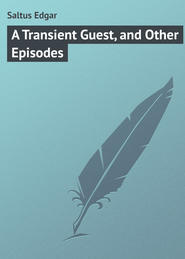По всем вопросам обращайтесь на: info@litportal.ru
(©) 2003-2024.
✖
Eden: An Episode
Настройки чтения
Размер шрифта
Высота строк
Поля
"You understand now, do you not?" he asked. "You understand and forgive?"
And Eden, as one who has weathered a storm and sees shipwreck imminent in port bowed her head. "It is truth," she told herself. "If he reads that note, he will kill me."
"You understand now, do you not?" he repeated. His voice was sonorous and caressing as an anthem, and he bent nearer that he might see her face.
"Too late!" she answered.
"No, Eden, not that. Look at me. You must not hide your eyes. In all the world there are none as fair as they. Look at me, Eden. Tell me that you forgive. I have pained you, I know; I have been stupid; but the pain has been unwitting and the stupidity born of love. Look at me, Eden. See," he continued, and bent at her side, "See, I ask forgiveness on my knees. Can you not give it me?"
"To you, yes, but never to myself." She spoke hoarsely, in a voice unlike her own; her eyes were not in his, they were staring at something in his hand, and as she stared, she seemed to shrink. The muscles of her face were rigid. And Usselex, perplexed at the fixidity of her gaze, followed the direction which her eyes had taken and saw that they rested on the note which he still held, crumpled and forgotten. For a second he looked at it wonderingly, "Why, it is from you," he exclaimed.
In that second, Eden, with the prescience that is said to visit those that drown, went forward and back, into the past and into the future as well. Amid her scattered yesterdays she groped for a promise. Of the unanswering morrows she called for release, and as her husband stood up, preparing to read what she had written, she felt herself the depository of shame.
The next instant she was at his side. "Give it me," she murmured. Her voice trembled a little, but she strove to render it assured. "Give it me," she pleaded.
Usselex turned to her at once. "Certainly, if you wish it," he said. "What is it about?"
He held the note to her, and she, with an affected air of indifference, took it from him and tossed it into the grate.
"Nothing," she answered, and then, as though ashamed of the falsehood, she looked him bravely in the face. "It was about your clerk."
"Adrian?" he asked. And as she nodded, tremulous still and unprepared for further questions, he added, "I hope you like him."
"You hope I like him?"
"Yes, he is my son."
Eden's hands went to her throat and her eyes to the grate. The note was already in a blaze.
"Yes," Usselex continued, "I have a bit of news for you. He is engaged to Miss Bolton. For a long time her parents objected, but last night they consented. It may be because he was at the opera with you. How small people can be!" he added. "She is a nice girl, though. Adrian told me this morning that he tried to speak to you about her the night I dined with Governor Blanchford, but that you did not seem interested."
"God in Heaven!" gasped Eden, beneath her breath. "If these are your punishments, what then are your rewards?"
Usselex had led her to a seat and taken her unresisting hand in his. For some little time he talked to her, very gently, as it behooves the strong to address the weak. And as he spoke, Mr. Menemon entered, and seeing them hand-locked and side-by-side, he smiled cheerily to himself with the air of a man who learns that all is well.
Usselex stood up at once, but for a little space Eden sat very still, surprised as February at a violet, then rising, she went forward to the window and looked out at the night. From the square beyond came the beat of drums, and on the breeze was borne to her the shrill treble of retreating fifes. And as she loitered at the window, conscious only of a sense of happiness such as she had never known before, her father called to her. She turned at his bidding. In the opposite doorway a servant stood.
"Dinner is served," he said.
And presently Mr. Menemon, as was his custom, mumbled a grace and thanksgiving to God.
THE END
notes
1
The reader is referred to The truth about Tristrem Varick.











